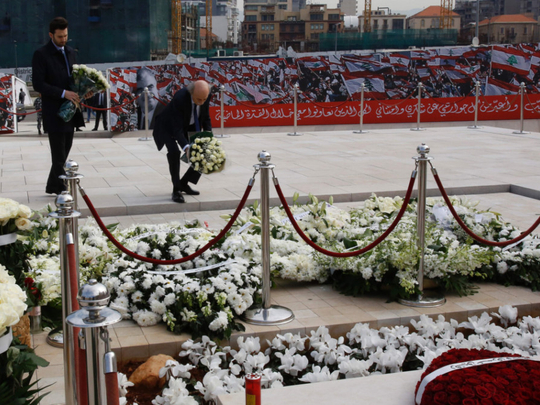
Beirut: For the 11th year running, thousands gathered to commemorate the assassination of Rafik Hariri, on Valentine’s Day in 2005. Hundreds of thousands watched on television screens though only MTV, Al-Jadeed, Future Television and LBC carried the commemoration live. OTV, TeleLiban, NBN and Al-Manar broadcast regularly scheduled programmes.
Speaking at the Biel Conference Centre, the fallen martyr’s son, former prime minister Sa’ad Hariri reiterated his commitment to his father’s memory. He repeated that no one stood above the state.
Hariri insisted that Lebanon belonged to everyone, not to a specific community, and that no party, on the strength of military might, could drag the Lebanese into adventures they disapprove of.
In a particularly strong comment, Hariri insisted that the Lebanese are Arabs and will not allow anyone to doubt that, or pit Lebanese Arabs against other Arabs, especially our brothers in Saudi Arabia and the Arab Gulf States. “We will never be Iranians,” Hariri thundered, and continued: “we are Arabs and we will remain so.”
He struck a popular note as he compared the presidential term of Michel Sulaiman and the period since, lamenting the void. He then presented a precis of developments that went from the selection of Geagea to Gemayel to Franjieh, affirming that he never backed Michel Aoun. His goal, Hariri affirmed, was to do everything in his ability to fill the immense political void that was created after Sulaiman ended his term on May 24, 2014.
It has now become quite clear, Hariri insisted, that that void is precisely what Hezbollah and March 8 seek. In a passionate speech, Hariri reiterated that March 14 was the true supporter of democracy because it was ready to elect a head of state, unlike March 8 that refuses to know the result before actual elections are held.
Hariri recalled the sacrifices of all those who were murdered so that Lebanon lives. “Ours,” said Hariri, “is a nationalist plan, that allows the Lebanese to build a country, while others have little more than sectarian objectives”.
“February 14 is Rafik Hariri’s day and all those who spilled their blood so that we remain free from all occupations, the Syrian in the past, and others now,” declared Hariri. “The fate of Lebanon is in our hands, not in Tehran’s,” he said, “and our weapons are the constitution and the spirit of freedom. Our martyrs are calling us to be faithful to God and to our land. All to free our country and we know exactly how to defend our nation.
He closed by asking what his father would have done if he was in his place. “I wish Rafik was standing in front of you.”
He then invited all March 14 leaders to join him for a commemorative photograph.
A full who’s who of Lebanon answered the call of duty, including Samir Geagea, the leader of the Lebanese Forces, as well as former president Amine Gemayel along with former first ladies Nayla Mouawad and Mona Hrawi. Sulaiman Franjieh, with whom Hariri spoke over the telephone, was not present. Neither was Michel Aoun, the leader of the Free Patriotic Movement, although several FPM ministers and deputies attended. Of course, there were no Hezbollah officials present, nor was Speaker Nabih Berri, the head of the Amal Party, in the audience.
The moribund March 14 movement, or what’s left of it, commemorated the fallen statesman’s legacy for the 11th year in a row, one wondered whether a little more could be achieved without the ability to elect a head of state.












